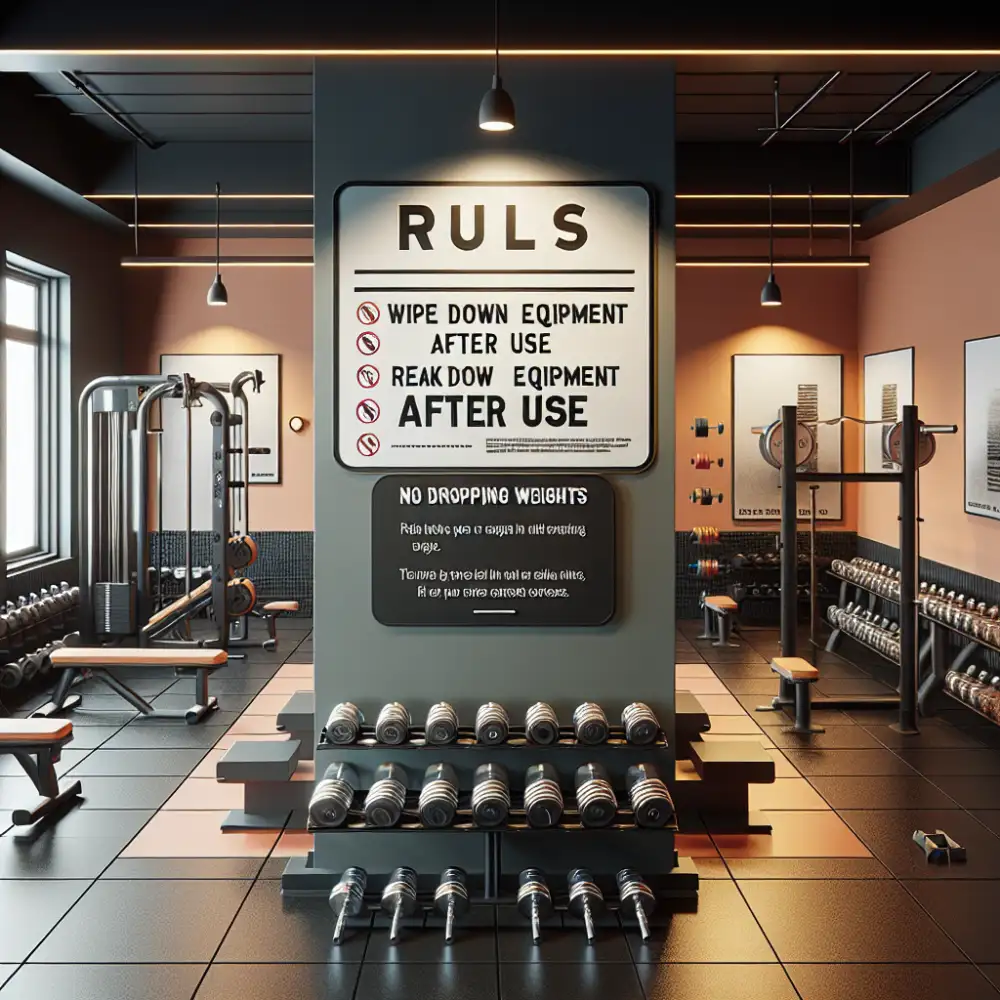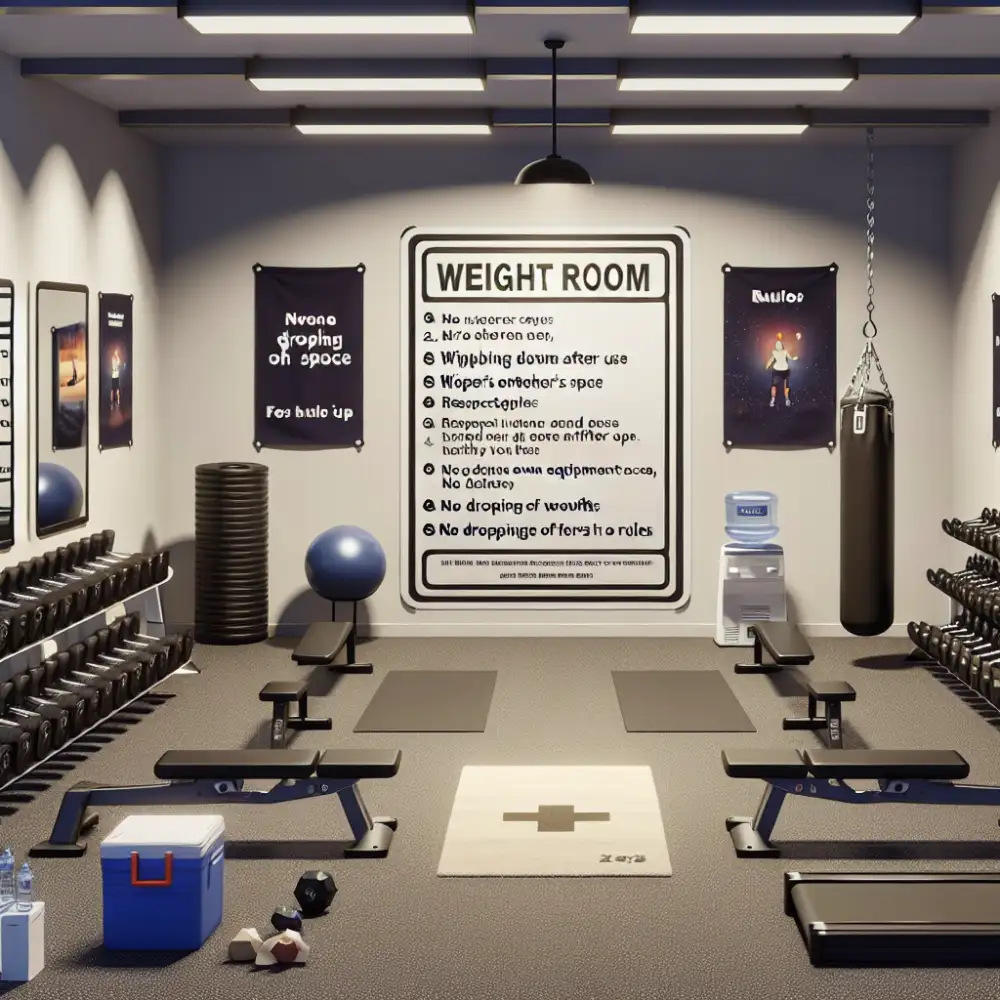Weight Room Rules: Lift Right, Live Right

Wipe down equipment
After a great workout, it's tempting to bolt out the door. But taking a few minutes to wipe down equipment is essential gym etiquette. Think about it: you don't want to lie down in a pool of someone else's sweat, right? Most gyms provide disinfectant sprays and paper towels for this purpose. Spray down any surfaces you touched, including cardio equipment handles, weight benches, and free weights. This simple act helps prevent the spread of germs and keeps the gym a clean and welcoming space for everyone.
Proper hydration essential
Staying properly hydrated is crucial for maintaining good health and well-being. Water plays a vital role in numerous bodily functions, including regulating body temperature, transporting nutrients, and flushing out waste products. When we don't drink enough fluids, we can become dehydrated, which can lead to various health problems.
Dehydration can manifest in many ways, ranging from mild symptoms like thirst and fatigue to more severe issues such as heat stroke and kidney problems. To avoid dehydration, it's essential to drink plenty of fluids throughout the day. The amount of water we need can vary depending on factors like activity level, climate, and overall health.
However, a general guideline is to aim for eight glasses of water per day. Listening to your body and drinking fluids when thirsty is crucial. You can also stay hydrated by consuming fruits and vegetables that have a high water content, such as watermelon and cucumber.
Listen to your body
Our bodies possess an incredible ability to communicate their needs, often through subtle cues and signals. Learning to listen to these messages is crucial for maintaining both physical and mental well-being. Ignoring persistent aches, pains, or fatigue can exacerbate underlying issues. Pay attention to how your body responds to stress, different foods, and activities. If you're feeling constantly drained, prioritize rest and relaxation. If you're experiencing digestive discomfort, examine your diet and consider potential food sensitivities. Remember, your body is your most valuable asset, and understanding its language is a lifelong journey of self-discovery and care.
Respect the iron, respect yourself, respect others.
Eamon Dempsey
Importance of warm-up
A proper warm-up is crucial before any workout. It prepares your body for the physical demands of exercise and helps prevent injuries. By gradually increasing your heart rate and blood flow, warm-up exercises loosen up your muscles and joints, improving flexibility and range of motion. This is essential to perform exercises with proper form and technique, maximizing your workout results while minimizing the risk of strains or tears. Moreover, warming up activates the nervous system, enhancing coordination and reaction time.

Cool down after workout
Just as you took time to warm up your muscles, it's crucial to allow them to cool down. This gradual decrease in intensity helps prevent blood from pooling in your lower body, which can lead to dizziness or lightheadedness. A proper cool-down also aids in recovery by reducing muscle soreness and stiffness. Spend 5-10 minutes performing light cardio, such as walking or jogging at a slower pace. Follow this with gentle stretching, holding each stretch for 15-30 seconds. This helps elongate your muscles, improve flexibility, and prevent tightness. Remember, a good cool-down is an essential part of a safe and effective workout.
Report injuries immediately
It doesn’t matter how minor you think an injury is, report it to your supervisor immediately. It's crucial to have a formal record of the incident. This documentation helps protect you and your employer. If complications arise later, you have proof of the injury and when it happened. This record is vital for insurance purposes and potential worker's compensation claims. Remember, even a seemingly insignificant cut can become infected or lead to unforeseen issues down the line.
Use spotters when needed
Always prioritize safety when lifting weights. If you're attempting a heavy lift, especially in exercises like bench presses or squats, having a spotter is crucial. A spotter can assist if your form falters or if you're unable to complete the lift, preventing potential injuries. Communicate clearly with your spotter about how many repetitions you're aiming for and when you might need assistance. Remember, a good spotter is focused on your safety and is there to support your workout, not to judge your performance.
Healthy eating habits help
Healthy eating habits are essential for maintaining a healthy weight, reducing the risk of chronic diseases, and improving overall health and well-being. A balanced diet rich in fruits, vegetables, whole grains, lean proteins, and healthy fats provides the body with the nutrients it needs to function properly.
These habits can help you manage your weight, blood sugar levels, and cholesterol levels, and reduce your risk of heart disease, stroke, type 2 diabetes, and some types of cancer. Additionally, healthy eating can improve your energy levels, mood, and sleep quality.
Making gradual changes to your diet, such as incorporating more fruits and vegetables, choosing whole grains over refined grains, and opting for lean protein sources, can have a significant impact on your health. Remember to drink plenty of water throughout the day and limit your intake of sugary drinks, processed foods, and unhealthy fats.

Published: 12. 06. 2024
Category: Health



